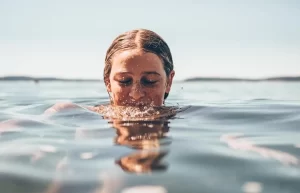
The lazy days of summer are coming to an end, so we know you’re probably trying to get in as many swimming days as possible. Whether you’re swimming in a pool or a lake, it’s important to take steps to protect your ears so that you don’t potentially damage your hearing.
Swimmer’s Ear
Have you ever heard of swimmer’s ear? Otitis externa (swimmer’s ear), an infection of the outer ear canal, is caused by water remaining in the ear after swimming. Swimmer’s ear is uncomfortable, causing redness, warmth, and pain. If water becomes trapped in the ear, you create a moist environment, which acts as a breeding ground for fungi and bacteria. If you swim in a natural body of water that is already full of bacteria, or a swimming pool or hot tub that isn’t properly sanitized and chlorinated, the contaminated water is more likely to breed bacteria in your inner ear and cause an infection.
Hearing Loss
Where does your hearing enter the equation? While it is highly unlikely that swimmer’s ear will cause hearing loss, ear infections can damage hair cells inside the ear. These hair cells are extremely fragile and they are responsible for transmitting sound. If you continuously get ear infections, you risk damaging these hair cells and impacting your hearing ability. These hair cells cannot regenerate once lost. In extreme cases, if gone untreated, the infection can spread to the inner ear and the brain and base of the skull, which can lead to temporary or permanent hearing loss.
Protecting your Ears
Thankfully, it is fairly easy to protect your ears and prevent swimmer’s ear. For starters, skip natural bodies of water that are full of bacteria, as well as pools and hot tubs that aren’t properly maintained. Do your research to make sure you’re swimming in a safe body of water free from bacteria. Before you dive in, be sure to put in earplugs. Disposable, water-resistant earplugs are easy to find, but if you’re an avid swimmer, you should look into custom-made earplugs.
There’s Water in My Ear—Help!
Even after taking safety precautions, there’s still a chance you may get water in your ear. If you feel water in your ears after you hop out of the lake or pool, do not stick your fingers in your ear canal! Doing so can cause more harm. Instead, carefully dry your outer ear with a soft, clean towel. Then, as you lean your head to one side, gently pull on your ear lobe to allow the water to flow out. You may notice that chewing or yawning can get the water to come out of your ears, too. If you still feel like you have water in your ear, you can put a solution of rubbing alcohol and vinegar, rubbing alcohol, or hydrogen peroxide in your ear. Just a few drops will help dry up the water. Heat and steam can also help; a blow dryer can help dry out the ear, or a heating pad set on low can help drain your ear.
Talk to your Doctor
If you suspect you have swimmer’s ear, talk to your doctor immediately to prevent the infection from getting worse. They can help you treat the infection with ear drops and can offer pain management options until the infection subsides.